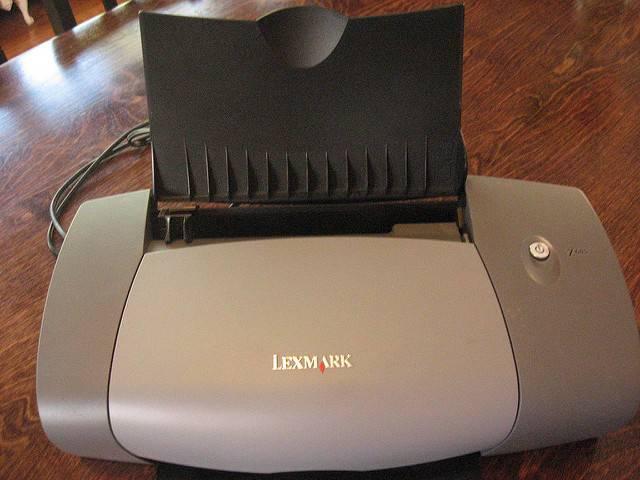
What’s the value of a lowly printer cartridge? Huge, in today’s startup market.
Last month, the Supreme Court heard oral arguments in a suit between printer manufacturer Lexmark and a small business that makes its money refilling printer cartridges. The issue, on the surface, if fairly boring: Printer giant Lexmark sued small-time printer cartridge refiller Impressions Products on the basis of patent violation.
Lexmark’s argument went like this: The manufacturer puts a shrink wrap on its cartridges, informing the consumer that the cartridge belongs to Lexmark. Opening that wrap implies the consumer agrees with the terms of use and that Lexmark is the sole authorized source for refilling those cartridges.
Up to now, Lexmark hasn’t had a lot of joy in winning cases on this point (and it’s sued a lot of resellers arguing various viewpoints). But last year that changed when a U.S. Court of Appeals found that Impressions violated Lexmark’s patent.
Impressions, of course, appealed the ruling, and last month the Supreme Court began the laborious process of sorting out the issues of this onerously complex case. As the SCOTUS Blog explains, the issue at hand is what's called patent exhaustion, in which “a patentholder’s rights to enforce its patent ordinarily are ‘exhausted’ with regard to any particular object at the moment the patentholder sells the object.”
Normally, that might seem pretty straightforward: The manufacturer of blue widgets sells a widget to a consumer, at which point the buyer is free to do whatever she/he chooses to do with it, including “repair” it.
But Lexmark’s argument is that it has the right to set conditions, and what’s more, the right to devise different types of contracts according to the product sectors it designs. Ergo, it has the right to say whether the consumer can resell the cartridge, and whether the refilling store can then refill and resell the item to other customers.
As several observers noted, the justices seemed a bit frustrated and confused about elements of this case. Justice Anthony Kennedy wanted to know why the issue of patent exhaustion hadn’t been codified already (with definitions and limitations under the law), as copyright exhaustion had been.
Justice Stephen Breyer, on the other hand, appeared somewhat skeptical of Lexmark’s argument, noting: “[Any] monopolist, including a patent monopolist, would love to be able to go to each buyer separately and extract from each buyer and user the maximum amount he would pay for that particular item. …. But by and large, that’s forbidden under many laws.”
So, you’re probably wondering: What’s the big deal when it comes to a seemingly boring debate over the rights to a printer cartridge? Whether or not Impressions can continue refilling Lexmark cartridges and selling them for, say, half the price Lexmark may charge its customers? That has limited impact on commerce at the end of the day, right?
Well, actually, no. The outcome of whether patent exhaustion can be affected by a manufacturer putting a shrink wrap on its product and defining what a customer can and can’t do with the new purchase can have monumental impact on many products we buy on a daily basis.
Obvious examples include the various replacement parts for cars or the repaired components in a computer. A ruling giving Lexmark contractual control over its products could conceivably define what thrift stores can accept, fix and resell. It could have huge implications on assumptions we, as consumers, have formed our purchasing habits around. As Costco stated in an amici curiae brief in support of Impressions:
"Goods of all kinds — computers, smartphones, automobiles, and even medicines — incorporate innumerable components made throughout the world. Each product developer and manufacturer would be required to trace to origin the patent rights of every single component it purchases. If it turns out that any individual component was first sold abroad—or even domestically, but subject to a condition on future reuse or resale—the manufacturer would then be required to negotiate an appropriate licensing agreement."
One perceptive writer dubbed this the "Citizens United of products" to highlight the fact that an equally banal case about whether companies have a constitutional right to make political contributions morphed into an issue that is now defining political elections.
But it also points to something else: The common assumptions upon which Western society bases its behaviors are being constantly upended by craftier arguments designed to circumvent practicality – and often in lieu of the consumer's understanding.
One would think the main reason a printer manufacturer sells ink cartridges is to complement the use of its key product, the printer. But in fact, the printer manufacturer really makes its money from the hefty price of ink cartridges – not the printers.
As Caroline Said of SFGate points out, the exorbitant price tag of a toner cartridge has spurred a no-holds-barred business marketplace from startups who know they can beat the shelf price and still make money.
I can’t help but wonder the implications for innovation if Lexmark wins this case. So often it’s the little guy’s ingenuity that brings about smarter, more ecologically-friendly answers to things. Stifling that input means competition will have less say in how “smart” a product design is, and a harder and more costly time arguing the case for resource-friendly change.
There probably won’t be any further discussion on this case by the Supreme Court until it rules in June.
Image credit: Flickr/Collin Anderson
Jan Lee is a former news editor and award-winning editorial writer whose non-fiction and fiction have been published in the U.S., Canada, Mexico, the U.K. and Australia. Her articles and posts can be found on TriplePundit, JustMeans, and her blog, The Multicultural Jew, as well as other publications. She currently splits her residence between the city of Vancouver, British Columbia and the rural farmlands of Idaho.














